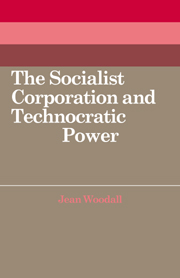 The Socialist Corporation and Technocratic Power
The Socialist Corporation and Technocratic Power Published online by Cambridge University Press: 07 October 2011
The main thrust of the argument so far has been to stress the importance of organisational factors in Polish industrial growth strategy. That there tends to be an overemphasis upon the industrial enterprise to the neglect of the role of intermediate levels of economic administration has also been elaborated upon. Yet in tracing the emergence of ‘socialist corporations’ we have still to assess whether this has been accompanied by the development of technocratic patterns of authority. The problems that these ‘socialist corporations’ present for the organisation and recruitment into a Marxist–Leninist party such as the PZPR are manifold and extend far beyond the matter of control over the appointment of managerial personnel. It is in the name of working-class interests that economic policy is made in Poland, but, although the PZPR claims a monopoly of legitimate policy-making, the representation of workers' interests is also entrusted to trade unions and the mechanism of workers' self-management. The response of these bodies to workforce interests must be investigated: do they act as an open channel for the articulation of grievances and suggestions, or do they seek to contain and restrain such initiatives, redirecting their force away from wider issues of management to the safer area of material consumption? The manner in which such institutions have responded to the need for economic integration in industry will be left to the next chapter.
To save this book to your Kindle, first ensure [email protected] is added to your Approved Personal Document E-mail List under your Personal Document Settings on the Manage Your Content and Devices page of your Amazon account. Then enter the ‘name’ part of your Kindle email address below. Find out more about saving to your Kindle.
Note you can select to save to either the @free.kindle.com or @kindle.com variations. ‘@free.kindle.com’ emails are free but can only be saved to your device when it is connected to wi-fi. ‘@kindle.com’ emails can be delivered even when you are not connected to wi-fi, but note that service fees apply.
Find out more about the Kindle Personal Document Service.
To save content items to your account, please confirm that you agree to abide by our usage policies. If this is the first time you use this feature, you will be asked to authorise Cambridge Core to connect with your account. Find out more about saving content to Dropbox.
To save content items to your account, please confirm that you agree to abide by our usage policies. If this is the first time you use this feature, you will be asked to authorise Cambridge Core to connect with your account. Find out more about saving content to Google Drive.